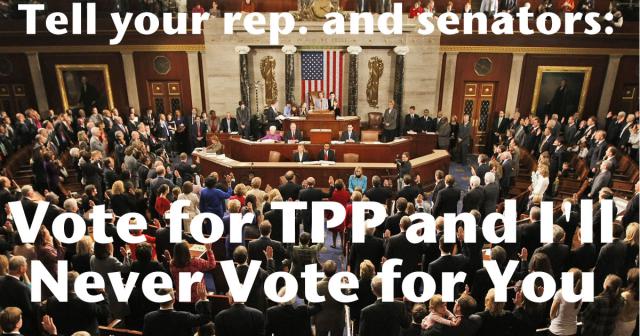Written by Rebel Fagin
The Trans-Pacific Partnership (TPP) is not just a trade deal, nor is it only “NAFTA on steroids”. The TPP is a corporate hijacking of our material world. The TPP corrupts American democracy while installing corporations as the rulers of the United States. Here’s how.
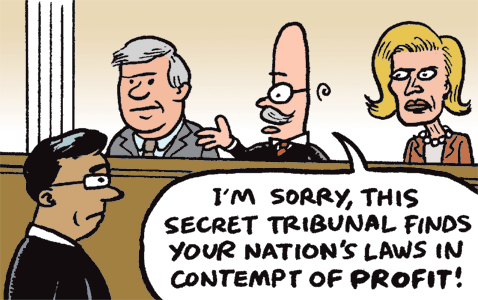 The TPP employees Investor-State Dispute Settlement Tribunals (ISDS) are used to adjudicate or make a judgment on all legal complaints. Three highly-paid corporate lawyers rotate between acting as counsel for the corporations one day and sitting in judgement of them the next. ISDS courts can force municipalities to change laws protecting human rights, workers’ rights or the environment, if these laws threaten potential, future profits, by levying suits amounting to millions or even billions of dollars against these governments, unless they change their laws to fit the needs or wants of the suing corporation. We have already seen this with the X-L Pipeline case. Under NAFTA, Trans-Canada, the oil pipeline Corporation is using ISDS courts to sue the U.S. government over president Barack Obama’s rejection of the Keystone XL pipeline for $15 billion; $3 billion for costs and $12 billion for lost, potential profits.
The TPP employees Investor-State Dispute Settlement Tribunals (ISDS) are used to adjudicate or make a judgment on all legal complaints. Three highly-paid corporate lawyers rotate between acting as counsel for the corporations one day and sitting in judgement of them the next. ISDS courts can force municipalities to change laws protecting human rights, workers’ rights or the environment, if these laws threaten potential, future profits, by levying suits amounting to millions or even billions of dollars against these governments, unless they change their laws to fit the needs or wants of the suing corporation. We have already seen this with the X-L Pipeline case. Under NAFTA, Trans-Canada, the oil pipeline Corporation is using ISDS courts to sue the U.S. government over president Barack Obama’s rejection of the Keystone XL pipeline for $15 billion; $3 billion for costs and $12 billion for lost, potential profits.
Another way the TPP corrupts democracy is through the TPP Commission as written in the text of chapter 27 of the Trans-Pacific Partnership. This body of unelected, international bureaucrats is mandated to periodically review and if need be, adjust the TPP to fit corporate needs after the treaty has been signed. This commission makes its own rules without input from Congress and is not bound by the US Constitution.
The TPP requires all signatory countries to adjust their national laws to fit this treaty. This is called regulatory harmonization or Regulatory Coherence as written in the text of chapter 25 of the Trans-Pacific Partnership. Under this provision, the will of citizens is subservient to the desires of corporations.
These three provisions, ISDS, TPP Commission, and Regulatory Coherence consolidate corporate power, enhance corporate privileges and dissolve democracy. Corporations are made up of people. So what kinds of people make up these corporations? Answer: Psychopaths.
Corporations, as shown in this documentary. The Corporation, are definitively psychopathic. Corporate behaviors display: callous disregard for the feelings of others, an incapacity to maintain enduring relationships, reckless disregard for the safety of others, deceitfulness, an incapacity to experience guilt and failure to conform to social norms in regards to lawful behavior. If the TPP passes, it will turn over the running of our world to known psychopaths. No corporation better typified this than Monsanto.
Monsanto began in 1901. Its first product was saccharin, which is an artificial sweetener, made from toluene, which occurs naturally in crude oil and petroleum. In 1977, the FDA, U.S. Food and Drug Administration moved to ban the use of saccharin in prepared foods after testing showed that it could cause bladder cancer. Congress rejected the FDA’s request and instead agreed that manufacturers would provide health warnings on their packaging.
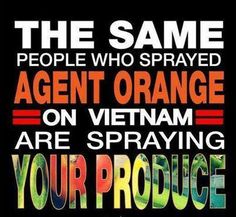 In the 1920’s, Monsanto began producing pesticides and herbicides, including what came to be known of as Agent Orange. Agent Orange is a defoliant made from 2,4-D and 2,4,-T. A defoliant is a chemical that removes the leaves from trees and plants and is often used in warfare. Agent Orange was used extensively in Vietnam by US armed forces during the Vietnam War. The Vietnam Veterans of America lists at least fifty illnesses and disease and nearly twenty separate birth defects connected to exposure to Agent Orange. Agent Orange is the gift that keeps on giving, as to this day, children in Vietnam are born with ghastly birth defects and nervous disorders.
In the 1920’s, Monsanto began producing pesticides and herbicides, including what came to be known of as Agent Orange. Agent Orange is a defoliant made from 2,4-D and 2,4,-T. A defoliant is a chemical that removes the leaves from trees and plants and is often used in warfare. Agent Orange was used extensively in Vietnam by US armed forces during the Vietnam War. The Vietnam Veterans of America lists at least fifty illnesses and disease and nearly twenty separate birth defects connected to exposure to Agent Orange. Agent Orange is the gift that keeps on giving, as to this day, children in Vietnam are born with ghastly birth defects and nervous disorders.
During the 1930’s, Monsanto began manufacturing polychlorinated biphenyls (PCBs). PCBs are a group of man-made chemicals that have been used in many different products including electrical equipment, surface coatings, inks, adhesives, flame-retardants, and pants. PCBs nay be released into the environment, for instance when waste that contains PCBs is destroyed by burning or stored in landfills. PCBs are so toxic that they were banned in the US during the 1970s but still pollute today because about 10% of the PCBs produced since 1929 still remain in the environment today. PCBs are carcinogenic, which means they have the potential to cause cancer. They accumulate in plants and animals and compound as they travel up the food chain towards us. From 1960 – 2000, Monsanto began acquiring dozens of seed and agricultural companies.
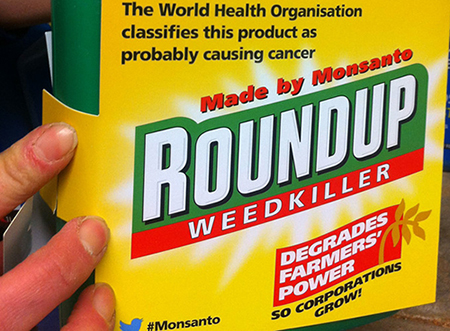 In 1976, Roundup, a glyphosate-based herbicide, was approved for use on certain crops. Roundup has been used in farms throughout the world and has been a top-selling weed killer. However researchers have found that one of Roundups inert ingredients can also kill human cells. Glyphosate is a confirmed endocrine disrupter that causes birth defects, miscarriages, infertility and sterility. The World Health Organization has ruled it a probable carcinogen. A carcinogen is a substance capable of causing cancer in living tissue.
In 1976, Roundup, a glyphosate-based herbicide, was approved for use on certain crops. Roundup has been used in farms throughout the world and has been a top-selling weed killer. However researchers have found that one of Roundups inert ingredients can also kill human cells. Glyphosate is a confirmed endocrine disrupter that causes birth defects, miscarriages, infertility and sterility. The World Health Organization has ruled it a probable carcinogen. A carcinogen is a substance capable of causing cancer in living tissue.
By 1982, Monsanto scientists had genetically modified a plant cell. In 1985, Monsanto began producing artificial sweetener aspartame for their new subsidiary, the NutraSweet Company. Aspartame, a GMO derivative, is linked to disorders ranging from seizures to tumors. In 1993, rBGH growth hormones were approved of by a former Monsanto employee working for the FDA, U.S. Food and Drug Administration. Injection of this hormone rBGH, forces cows to boost milk production by about 10%, but causes health problems in cows that must be treated with antibiotics. This contributes to the development of drug-resistant bacteria that can sicken humans. In 2008, Monsanto sold its rBGH product to Eli Lilly.
Roundup by Monsanto is the brand name for herbicide, glyphosate. It is used to kill weeds. Glyphosate works by preventing weeds and all plants from being able to make the proteins they need to survive. Since virtually all plants make these essential proteins the same way, glyphosate affects nearly all plants, including those that we need. It was in 1996, that Mansanto’s GMO Roundup Ready soybeans, canola and cotton were introduced to US markets. Two years later, Roundup Ready corn joined them. Roundup Ready seeds are immune to the effects of Roundup. Over 80% of all GMOs are designed to be Roundup Ready and thereby resist glyphosate.
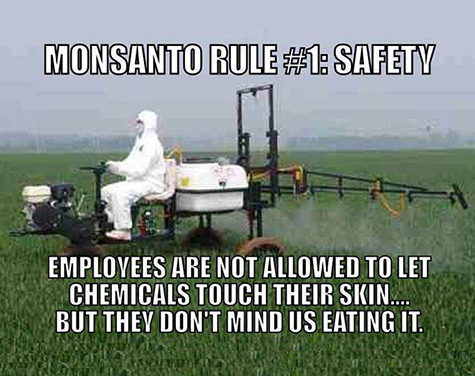 Farmers use Roundup to kill everything that isn’t Roundup Ready. Naturally, weeds and pests evolve to resist Roundup and the farmers need to use more herbicides and pesticides to achieve the same results. For Monsanto’s bottom line, this is a double win. Roundup glyphosate sold by Monsanto to kill weeds, while also killing other plants. Roundup Ready, also sold by Monsanto to resist Roundup from killing the plants that we need. The development of glyphosate resistance in weed species is emerging as a costly problem. But maybe Monsanto behind closed doors is cheering for the increased resistance of weeds so that more of their glyphosate they call Roundup can be purchased and used to kill more weeds. Of course, Monsanto will likely ignore the concerns about their effects on humans, the environment and the plants we need.
Farmers use Roundup to kill everything that isn’t Roundup Ready. Naturally, weeds and pests evolve to resist Roundup and the farmers need to use more herbicides and pesticides to achieve the same results. For Monsanto’s bottom line, this is a double win. Roundup glyphosate sold by Monsanto to kill weeds, while also killing other plants. Roundup Ready, also sold by Monsanto to resist Roundup from killing the plants that we need. The development of glyphosate resistance in weed species is emerging as a costly problem. But maybe Monsanto behind closed doors is cheering for the increased resistance of weeds so that more of their glyphosate they call Roundup can be purchased and used to kill more weeds. Of course, Monsanto will likely ignore the concerns about their effects on humans, the environment and the plants we need.
Genetically engineered Bt cotton seed was introduced to farmers in India by Monsanto in 2002. By 2010, 87% of all Indian cotton was grown from this hybrid. Being a hybrid, it was sterile, so farmers had to buy seeds every year. This water-hungry cotton was developed to resist bollworms, an insect that can lessen the growth of cotton. Those bollworms who were immune to the pesticide survived and propagated, so farmers had to use more pesticides to defeat them. Then the price of the seed skyrocketed by 8000%. Farmers had to pledge future crops, backed by their land deeds, as collateral so they could borrow money for seeds. When they couldn’t pay their debt, many of them went out into their fields, drank Monsanto’s pesticide and died. By 2009, 17,638 Indian farmers had committed suicide this way. In 2012, the state of Maharashtra banned Monsanto’s Bt cotton seed.
In September 2014, Enlist Duo seeds were approved by the FDA. These seeds combine 2,4-D with glyphosate, and are expected to increase the use of pesticides and herbicides by up to 600% as insects and weeds evolve to survive this deadly duo.
These psychopathic behaviors are driven by the profit motive. Monsanto is merely an example of this corporate culture. Most major corporations aren’t much different. All of them are free market fundamentalists. We can expect more of these psychopathic behaviors if the TPP passes Congress. We must work to stop the TPP. Contact your member of Congress and voice your opposition while there is still time. Many members of Congress are against the TPP. We have the wind at our back. Our democracy, our lives and the lives of our children are at stake. Act now.
Additional Sources: the Corporation © 2005, T.U.C. radio 10/8/15, Vandana Shiva speaking at the Willits Grange 9/7/15, Sonoma County, CA Trash the TPP’s cheat sheet.
Source: Rebel Fagin who writes for the Sonoma County, CA Peace Press and Global Critical Media Literacy Project (gcml.org)
